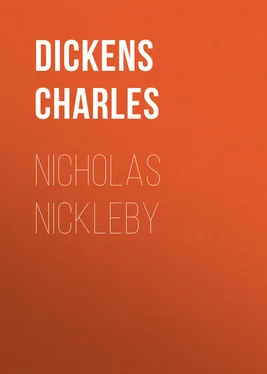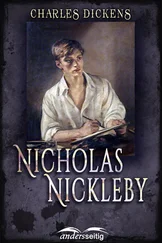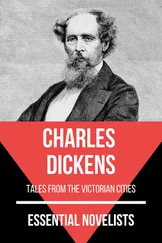Charles Dickens - Nicholas Nickleby
Здесь есть возможность читать онлайн «Charles Dickens - Nicholas Nickleby» — ознакомительный отрывок электронной книги совершенно бесплатно, а после прочтения отрывка купить полную версию. В некоторых случаях можно слушать аудио, скачать через торрент в формате fb2 и присутствует краткое содержание. Жанр: foreign_antique, foreign_prose, на английском языке. Описание произведения, (предисловие) а так же отзывы посетителей доступны на портале библиотеки ЛибКат.
- Название:Nicholas Nickleby
- Автор:
- Жанр:
- Год:неизвестен
- ISBN:нет данных
- Рейтинг книги:3 / 5. Голосов: 1
-
Избранное:Добавить в избранное
- Отзывы:
-
Ваша оценка:
- 60
- 1
- 2
- 3
- 4
- 5
Nicholas Nickleby: краткое содержание, описание и аннотация
Предлагаем к чтению аннотацию, описание, краткое содержание или предисловие (зависит от того, что написал сам автор книги «Nicholas Nickleby»). Если вы не нашли необходимую информацию о книге — напишите в комментариях, мы постараемся отыскать её.
Nicholas Nickleby — читать онлайн ознакомительный отрывок
Ниже представлен текст книги, разбитый по страницам. Система сохранения места последней прочитанной страницы, позволяет с удобством читать онлайн бесплатно книгу «Nicholas Nickleby», без необходимости каждый раз заново искать на чём Вы остановились. Поставьте закладку, и сможете в любой момент перейти на страницу, на которой закончили чтение.
Интервал:
Закладка:
Charles Dickens
Nicholas Nickleby
AUTHOR’S PREFACE
This story was begun, within a few months after the publication of the completed “Pickwick Papers.” There were, then, a good many cheap Yorkshire schools in existence. There are very few now.
Of the monstrous neglect of education in England, and the disregard of it by the State as a means of forming good or bad citizens, and miserable or happy men, private schools long afforded a notable example. Although any man who had proved his unfitness for any other occupation in life, was free, without examination or qualification, to open a school anywhere; although preparation for the functions he undertook, was required in the surgeon who assisted to bring a boy into the world, or might one day assist, perhaps, to send him out of it; in the chemist, the attorney, the butcher, the baker, the candlestick maker; the whole round of crafts and trades, the schoolmaster excepted; and although schoolmasters, as a race, were the blockheads and impostors who might naturally be expected to spring from such a state of things, and to flourish in it; these Yorkshire schoolmasters were the lowest and most rotten round in the whole ladder. Traders in the avarice, indifference, or imbecility of parents, and the helplessness of children; ignorant, sordid, brutal men, to whom few considerate persons would have entrusted the board and lodging of a horse or a dog; they formed the worthy cornerstone of a structure, which, for absurdity and a magnificent high-minded Laissez-Aller neglect, has rarely been exceeded in the world.
We hear sometimes of an action for damages against the unqualified medical practitioner, who has deformed a broken limb in pretending to heal it. But, what of the hundreds of thousands of minds that have been deformed for ever by the incapable pettifoggers who have pretended to form them!
I make mention of the race, as of the Yorkshire schoolmasters, in the past tense. Though it has not yet finally disappeared, it is dwindling daily. A long day’s work remains to be done about us in the way of education, Heaven knows; but great improvements and facilities towards the attainment of a good one, have been furnished, of late years.
I cannot call to mind, now, how I came to hear about Yorkshire schools when I was a not very robust child, sitting in bye-places near Rochester Castle, with a head full of Partridge, Strap, Tom Pipes, and Sancho Panza ; but I know that my first impressions of them were picked up at that time, and that they were somehow or other connected with a suppurated abscess that some boy had come home with, in consequence of his Yorkshire guide, philosopher, and friend, having ripped it open with an inky pen-knife. The impression made upon me, however made, never left me. I was always curious about Yorkshire schools – fell, long afterwards and at sundry times, into the way of hearing more about them – at last, having an audience, resolved to write about them.
With that intent I went down into Yorkshire before I began this book, in very severe winter time which is pretty faithfully described herein. As I wanted to see a schoolmaster or two, and was forewarned that those gentlemen might, in their modesty, be shy of receiving a visit from the author of the “Pickwick Papers,” I consulted with a professional friend who had a Yorkshire connexion, and with whom I concerted a pious fraud. He gave me some letters of introduction, in the name, I think, of my travelling companion; they bore reference to a supposititious little boy who had been left with a widowed mother who didn’t know what to do with him; the poor lady had thought, as a means of thawing the tardy compassion of her relations in his behalf, of sending him to a Yorkshire school; I was the poor lady’s friend, travelling that way; and if the recipient of the letter could inform me of a school in his neighbourhood, the writer would be very much obliged.
I went to several places in that part of the country where I understood the schools to be most plentifully sprinkled, and had no occasion to deliver a letter until I came to a certain town which shall be nameless. The person to whom it was addressed, was not at home; but he came down at night, through the snow, to the inn where I was staying. It was after dinner; and he needed little persuasion to sit down by the fire in a warm corner, and take his share of the wine that was on the table.
I am afraid he is dead now. I recollect he was a jovial, ruddy, broad-faced man; that we got acquainted directly; and that we talked on all kinds of subjects, except the school, which he showed a great anxiety to avoid. “Was there any large school near?” I asked him, in reference to the letter. “Oh yes,” he said; “there was a pratty big ‘un.” “Was it a good one?” I asked. “Ey!” he said, “it was as good as anoother; that was a’ a matther of opinion”; and fell to looking at the fire, staring round the room, and whistling a little. On my reverting to some other topic that we had been discussing, he recovered immediately; but, though I tried him again and again, I never approached the question of the school, even if he were in the middle of a laugh, without observing that his countenance fell, and that he became uncomfortable. At last, when we had passed a couple of hours or so, very agreeably, he suddenly took up his hat, and leaning over the table and looking me full in the face, said, in a low voice: “Weel, Misther, we’ve been vara pleasant toogather, and ar’ll spak’ my moind tiv’ee. Dinnot let the weedur send her lattle boy to yan o’ our school-measthers, while there’s a harse to hoold in a’ Lunnun, or a gootther to lie asleep in. Ar wouldn’t mak’ ill words amang my neeburs, and ar speak tiv’ee quiet loike. But I’m dom’d if ar can gang to bed and not tellee, for weedur’s sak’, to keep the lattle boy from a’ sike scoondrels while there’s a harse to hoold in a’ Lunnun, or a gootther to lie asleep in!” Repeating these words with great heartiness, and with a solemnity on his jolly face that made it look twice as large as before, he shook hands and went away. I never saw him afterwards, but I sometimes imagine that I descry a faint reflection of him in John Browdie.
In reference to these gentry, I may here quote a few words from the original preface to this book.
“It has afforded the Author great amusement and satisfaction, during the progress of this work, to learn, from country friends and from a variety of ludicrous statements concerning himself in provincial newspapers, that more than one Yorkshire schoolmaster lays claim to being the original of Mr. Squeers. One worthy, he has reason to believe, has actually consulted authorities learned in the law, as to his having good grounds on which to rest an action for libel; another, has meditated a journey to London, for the express purpose of committing an assault and battery on his traducer; a third, perfectly remembers being waited on, last January twelve-month, by two gentlemen, one of whom held him in conversation while the other took his likeness; and, although Mr. Squeers has but one eye, and he has two, and the published sketch does not resemble him (whoever he may be) in any other respect, still he and all his friends and neighbours know at once for whom it is meant, because – the character is so like him.
“While the Author cannot but feel the full force of the compliment thus conveyed to him, he ventures to suggest that these contentions may arise from the fact, that Mr. Squeers is the representative of a class, and not of an individual. Where imposture, ignorance, and brutal cupidity, are the stock in trade of a small body of men, and one is described by these characteristics, all his fellows will recognise something belonging to themselves, and each will have a misgiving that the portrait is his own.
Читать дальшеИнтервал:
Закладка:
Похожие книги на «Nicholas Nickleby»
Представляем Вашему вниманию похожие книги на «Nicholas Nickleby» списком для выбора. Мы отобрали схожую по названию и смыслу литературу в надежде предоставить читателям больше вариантов отыскать новые, интересные, ещё непрочитанные произведения.
Обсуждение, отзывы о книге «Nicholas Nickleby» и просто собственные мнения читателей. Оставьте ваши комментарии, напишите, что Вы думаете о произведении, его смысле или главных героях. Укажите что конкретно понравилось, а что нет, и почему Вы так считаете.












